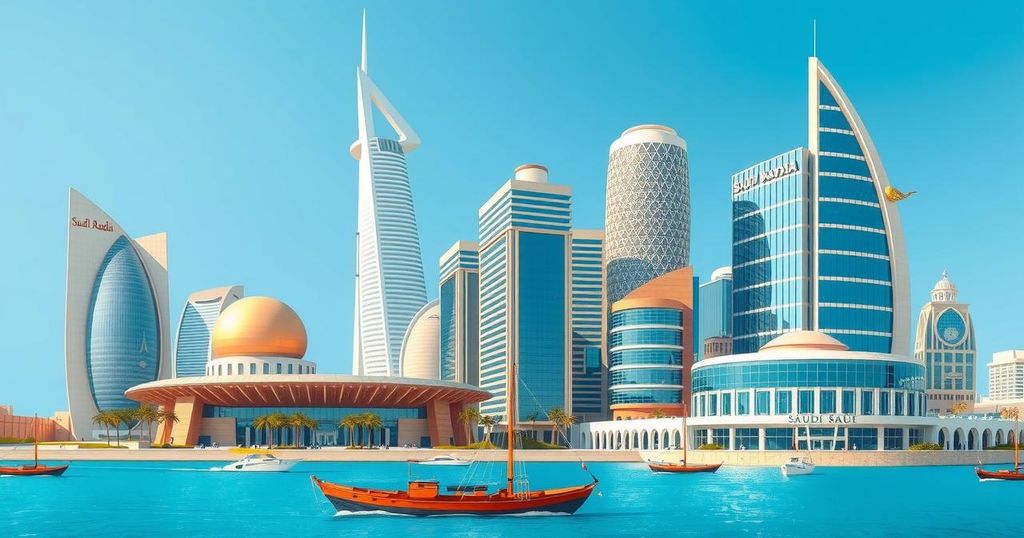Saudi Arabia is actively reshaping its image as a diplomatic leader, hosting significant events involving global leaders, including a summit with Ukraine’s President Zelenskyy. Under Crown Prince Mohammed bin Salman, the kingdom embraces reforms and cultural openness, seeking to position itself as a vital mediator in global conflicts. However, it continues to face criticism for its human rights violations, raising complex questions about its role in international politics.
Saudi Arabia is hosting a significant summit that involves Secretary of State Marco Rubio and Ukrainian President Volodymyr Zelenskyy, marking an effort to improve diplomatic relations. The country has been reshaping its image to position itself as a key mediator in global conflicts, hosting various negotiations over recent years. This shift follows a period where the U.S. labeled Saudi Arabia a “pariah” amidst persistent human rights concerns.
Under Crown Prince Mohammed bin Salman (MBS), Saudi Arabia is evolving from a conservative theocracy into a prominent global diplomatic player. Crown Prince MBS aims to foster an image centered around diplomacy, tourism, entertainment, and sports. This transformation is essential, particularly as the kingdom seeks to engage in discussions on various international issues, such as the ongoing conflict in Ukraine and future relations in Gaza.
Analysts note that Saudi Arabia, under MBS, is more active and influential on the world stage than in the past. Thomas Lippman from the Middle East Institute characterizes the nation as a modern player, reflecting increased openness and education among its populace. Recent U.S.-Saudi relations have been rekindled, particularly with Trump’s announcement of a future visit to Saudi Arabia that mirrors his first-term diplomatic engagements.
However, the relationship between Riyadh and the Trump family raises ethical concerns, especially regarding significant investments intertwined with politics. Sen. Ron Wyden has voiced concerns over potential conflicts involving Saudi investments linked to Trump’s son-in-law, Jared Kushner. F. Gregory Gause III indicated a historical closeness between Saudi business interests and state operations, stressing the implications of this blending in U.S. political landscapes.
Saudi Arabia’s aspiration to serve as a diplomatic hub extends beyond individual relationships; it recently hosted discussions between the U.S. and Russia and is seeking to be an alternative site for international diplomacy. Gause mentions that the kingdom is among countries maintaining good ties with both the U.S. and China, showcasing its strategic positioning.
A crucial part of this rebranding is Vision 2030, a grand plan led by MBS aimed at diversifying the economy away from heavy oil dependency. The country is also embracing cultural openness, evident in its hosting of major sports events and investments in global sports, such as its influence in the English Premier League and the establishment of the LIV golf tour.
Despite improvements, Saudi Arabia still grapples with a serious human rights track record. Reports reveal ongoing significant abuses, including unlawful killings and severe repression of dissent. While reforms have been noted, particularly regarding women’s rights and public behaviors, numerous issues persist, as highlighted by Rayan Alyusufi, a Saudi student advocating for recognition of recent changes alongside persistent abuses.
Engagement with Saudi Arabia seems to be viewed similarly to interactions with China, emphasizing a relationship with a government known for severe repression but also bearing substantial global influence and importance in international discussions.
Saudi Arabia’s efforts to rebrand itself as a diplomatic power are reflected in its hosting of key events and dialogues, particularly regarding the Ukraine conflict. Under Crown Prince MBS, the kingdom aims to shift from pariah status to a crucial middleman in global matters. However, despite notable reforms, significant human rights abuses remain a critical challenge. The contradiction between diplomatic engagement and ongoing rights violations exemplifies the complexities of Saudi Arabia’s position in world politics today.
Original Source: www.nbcnews.com






